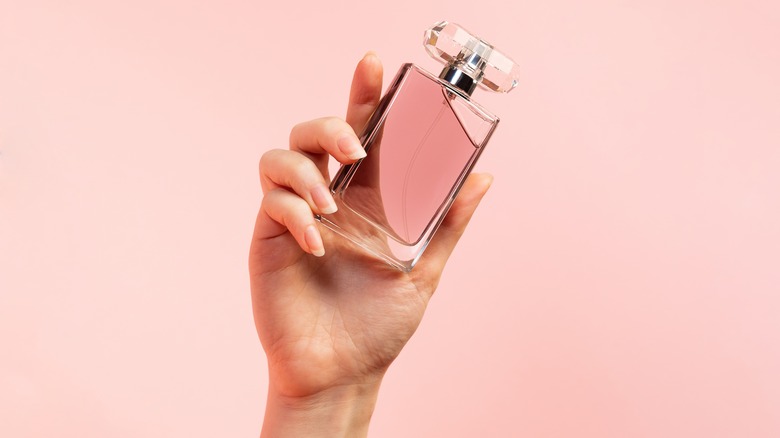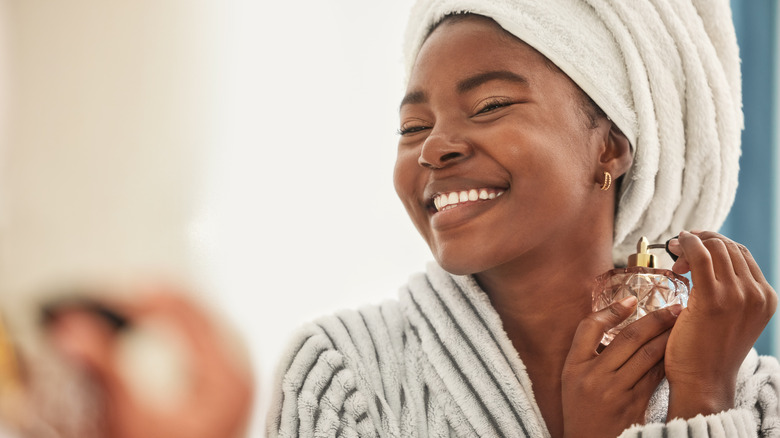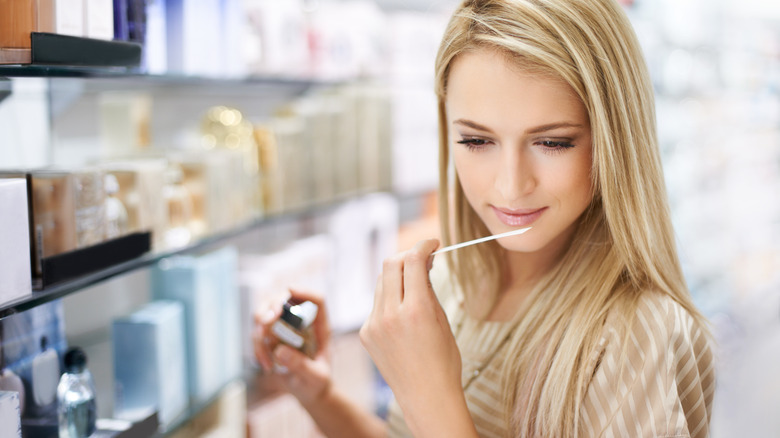The Aromatic Reason You Should Tap Your Perfume Instead Of Rubbing It Into Your Skin
Picture this: you just bought an expensive bottle of perfume, and you're ecstatic to have everyone whiff of your new scent. You spray it all over your body and clothes, secretly hoping the people you encounter will turn their heads and feel captivated. But at the end of the day, you find out that the fragrance barely retained on your clothes, much less your skin. What gives?
Even if you own the most potent perfume concentration in the history of ever, it's still not guaranteed that it will stay on your skin. As it turns out, your perfume's lasting power still depends on how you apply it, your body chemistry, skin type, and where you do the spritzing. Applying scents may seem as easy as walking into a "perfume cloud," but ensuring its longevity is a whole other story and apparently requires a different set of techniques. You may be applying perfume incorrectly and might not even know it. According to experts, rubbing and merely spraying is a no-no.
Rubbing perfume can make the scent less potent
There's a long-running misconception that the key to making perfume last longer on your skin is rubbing it behind your ears and wrists. Many of us have already developed this habit, but according to Carina Chaz, founder of a perfume company called DedCool, it's a habit we ought to break. She explained that this so-called technique is counterintuitive and does the opposite of making the scent last. "Fragrance application can be delicate," she told Byrdie, adding that perfume is meant to "sit on skin in order to mix with your natural oils." When you rub the scent on your skin, you only interfere with the top notes, which can result in fading or drying out altogether.
Instead of rubbing, you may want to let the perfume dry on its own and let your skin absorb it naturally. But if you're not the type to wait (we get it), you can gently dab it on your pulse points to help it deposit onto your skin much faster. Another trick is applying it on parts of the body where heat is retained, aka your pulse points. "All your pulse points are like little radiators," fragrance brand Skylar founder, Cat Chen, shared with mindbodygreen. "The warmth helps to diffuse the fragrance."
Tips for making your perfume last longer
Now while there are several other hacks that you can try to help your beloved perfume last longer on your skin, you should never overlook the type of perfume you wear. Linda Levy, president of The Fragrance Foundation, explained to InStyle that a perfume's longevity largely depends on how much fragrance oil is in it. "A higher fragrance oil concentrate can help a consumer distinguish how strong and how long-lasting the fragrance will be on their skin," she said, noting that Eau de parfums have roughly 20 to 25 percent concentration of said oils, while lesser is found on Eau de toilettes.
The truth of perfume includes the ingredients, too, according to Jackie Duignan of Clarins Fragrance Group. "Heart and base notes of ambers, woods, and musks of Eau de Parfum tend to linger on your skin much longer whereas citrus scents evaporate much quicker and need to be reapplied more frequently," she shared with Good Housekeeping. But if you insist on citrus scents, you may want to try layering or applying different products with the same scent, like a combination of lotions, oils, and hair spray.
You may also be tempted to reapply perfume throughout the day, but you must be careful about overdoing it. The last thing you want is to make people stay far away from you due to the overwhelming scent. But if you must reapply, when, say, after a workout, it's better to do less spritzing than what you did the first time.


